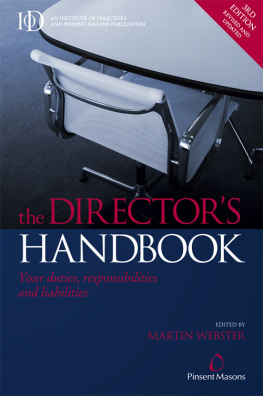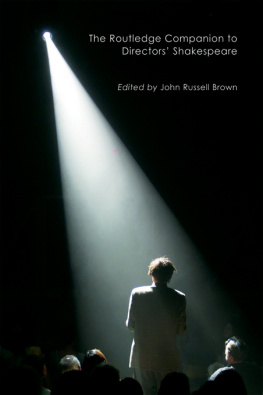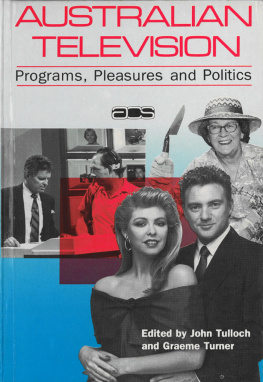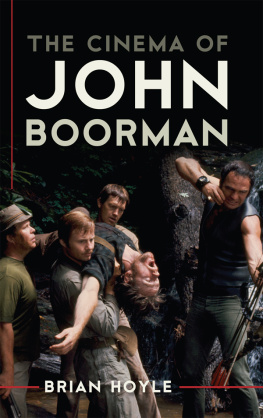Television: The Director's Viewpoint
Also in This Series
Big Story: How the American Press and Television Reported and Interpreted the Crisis of Tet 1968 in Vietnam and Washington, Peter Braestrup
Westview Special Studies in Communications
Television: The Director's Viewpoint
John W. Ravage
Television directors remain an enigma to most students of the mass media; traditionally, their function has been little understood by scholars and the viewing public. In this book, John Ravage studies the role of the director in the producer-dominated medium of commercial television. Built around lengthy interviews with twelve of the leading directors of commercial programsrepresenting all the genres of "prime time"the book analyzes the major issues facing television, its past, present, and portents for the future, and the audience that watches it.
John W. Ravage is associate professor of telecommunication at the University of Wyoming. He has worked in commercial radio and television, written for television, and recently worked at Universal Studios in California.
Television: The Director's Viewpoint
John W. Ravage
First published 1978 by Westview Press
Published 2019 by Routledge
52 Vanderbilt Avenue, New York, NY 10017
2 Park Square, Milton Park, Abingdon, Oxon OX14 4RN
Routledge is an imprint of the Taylor & Francis Group, an informa business
Copyright 1978 by Taylor & Francis
All rights reserved. No part of this book may be reprinted or reproduced or utilised in any form or by any electronic, mechanical, or other means, now known or hereafter invented, including photocopying and recording, or in any information storage or retrieval system, without permission in writing from the publishers.
Notice:
Product or corporate names may be trademarks or registered trademarks, and are used only for identification and explanation without intent to infringe.
Library of Congress Cataloging in Publication Data
Ravage, John W.
The television director.
(Westview special studies in communications)
Includes index.
1. TelevisionProduction and direction. 2. Television broadcastingUnited States.
I. Title.
PN1992.75.R34 791.45'0233 78-3789
ISBN 13: 978-0-367-28981-2 (hbk)
To Linda my best friend
This work required nearly eighteen months to complete. Over that period, many came to my aid with suggestions and insights. I am especially grateful to Dr. Gage Chapel for his help, advice, and conversation.
In addition, special attention should be drawn to the aid which the University of Wyoming gave me through the Arts and Sciences Basic Research Program.
In writing this book, I talked with a large number of professionals in addition to those whose interviews are included in the text. Whatever insights exist in this work are largely a distillation of the observations of these film and video professionals. They include: Danny Arnold, producer and director; Nicholas Baehr, writer; Billy Barty, actor; Ron Carey, actor; John Chulay, director; Fielder Cook, director; Ivan Dixon, actor and director; Jaime Farr, actor; Ron Glass, actor; Dwight Hemion, director; Ted Knight, actor; Bob Lally, director; Richard Levinson, producer and writer; Bill Link, producer and writer; Jerry Markus, director; Jeff Melman, assistant director; Harry Morgan, actor; Jay Sandrich, director; Isabel Sanford, actress; Pat Shields, director; Loretta Swit, actress; and George Thompson, director.
Whatever shortcomings are apparent in this book are my responsibility. The insights derive from the evaluations and observations of the above-listed people.
Commercial television compels the largest mass audience of any dramatic format in history. Ordinarily, 10 to 20 million viewers will watch one program; in 1978, 86 million watched the Super Bowl in January. Not surprisingly, groups appraise the content of programming with evaluations ranging from "excellent" to "terrible," the negative terms being predominant. Philosophers, politicians, social historians, and ordinary viewers protest programs. Few come to the defense of television.
The purpose of this book is neither to defend nor to attack contemporary television; the medium is far too diverse to be approached in such a facile manner. Instead, this text searches for an insight into television production derived from an insider's perspectivethat of the television director.
The television director is generally unrecognized by audiences, even though they may be familiar with the major directors of motion pictures. This fact alone says much about the transitory nature of most television, a dramatic form which stresses quantity and popularity above all other concerns.
Directors, however, control the form and emphases of programs to an extent approached by few other members of a production. For that reason it seems valid to seek the views of these professionals to help illuminate various pressing issues in television today.
This is a study of commercial television, rather than of public broadcasting, cable communications, or educational/instructional programming. Commercial, network television is the primary entertainment form of our time. As yet, the audience for public and special-interest broadcasting does not approach that of the commercial networks. The directors, actors, writers, and producers interviewed for this book represent the main dramatic formats of network televisionsituation comedy and melodrama. News, public affairs, and children's and daytime programs are not represented. The directors on which this work focuses vary widely in age, training, temperament, and sensitivity. There is no single approach to either direction or production, and these people's works and perspectives are varied.
To all those who wish to understand more about the content of today's television, and the motivations of networks, advertisers, producers, writers, and actors, the views of these directors should be important; they contain unique perceptions of this, the most popular entertainment device of our times.
The Milieu of American Television
The center of American television lies at the southern extreme of the San Andreas fault, in the Los Angeles area. Ninety percent of what the American television networks produce is created at this point.
The impact of televised material upon the nation is enormous greater than that of any other mass medium in our society. Children grow up imitating the heroes and heroines of television. Housewives trace out the days of their lives on the soap operas. Colleges and universities assemble programs of study for careers in television, for which their students have a ridiculously low chance of employment. In short, we are mesmerized by those images on the flickering cathode-ray tube, hypnotized to a degree that has changed our politics, our entertainment, and our self concepts.
Before any study of television may begin, it seems imperative that the organizational structures and patterns of commercial television should be understood, since few people except those who work in or study "the business" are conversant with the managerial and production elements of the medium.










